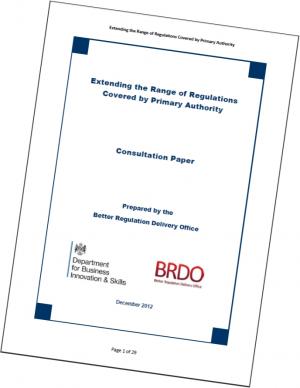



The government is consulting on extending the Primary Authority scheme to the Housing Health and Safety Rating System. Under the Primary Authority scheme an organisation or individual that works across a number of authorities can select a Primary Authority as a first point of advice and to secure a consistent set of enforcement standards.
HHSRS
Regarding the HHSRS the consultation notes:
2.14 Government believes that private landlords should be able to access Primary Authority support in complying with their obligations under the Housing Health and Safety Rating System. Assured advice, for example on interpreting the standards which are required, will enable them to act with certainty to protect their tenants, encouraging a proactive approach. In this way, partnership working should improve protections and minimise complaints.
2.15 We recognise the important flexibility which the Housing Health and Safety Rating System provides, in terms of enforcement actions chosen when breaches occur. It is vital for officers to be able to consider the local context and specific circumstances of each case in order to best serve the community in which they work. We do not believe that inclusion in the Primary Authority scheme will compromise this discretion. The primary authority, in issuing assured advice, sets out clear standards which the business must meet. If a primary and local authority agreed that those standards were missed, the inspecting officer would be free to decide on the best course of action.
The draft SI involves adding Part 1 of the Housing Act 2004 to the list of eligible enforcement statute (Parts 2 to 4 are already included).
It is hard to predict how such a change would affect empty homes interventions as the owners of problematic empties that practitioners deal with are rarely likely to be the kind of people that would embrace the partnership approach involved in the Primary Authority scheme. And where a more engaged landlord, housing association or self-help housing organisation does choose to work with a Primary Authority on its refurbishment work, that is unlikely to cause problems for empty homes practitioners in the authority where the property is situated.
Consequenlty EHN is unlikely to be submitting a consultation response, but if practitioners do have comments then please reply to this post for consideration by the EHN Executive.
The consultation document can be downloaded from here.
Primary Authority
Primary Authority is an initiative of the Better Regulation Delivery Office *part of the Business, Innovation and Skills Department) and you can find more about it from here. The consultation does provide a brief overview as follows:
Primary Authority allows a business to form a partnership with one local authority in order to receive tailored support in relation to a range of regulations. Broadly, the primary authority may assist businesses in three ways: by issuing assured advice, coordinating enforcement action and developing an inspection plan.
...
i) Assured advice
The primary authority provides the business with assured advice on fulfilling its regulatory obligations. This advice must be followed by other local authorities where the business operates. For example; if a primary authority issues advice that a business‟ procedures preventing slips and trips are sufficient to fulfil its legal obligation, another authority cannot insist that an alternative approach is used in its area.
ii) Coordinating enforcement action
The primary authority coordinates enforcement action proposed against the business. Where enforcement action is proposed against the business, it must initially be notified to the primary authority, which assesses whether the proposed action is consistent with assured advice issued to the business. Experience of the Primary Authority scheme to date indicates a reduction in enforcement activity, as an approach to manage issues can often be agreed as a result of liaison between the enforcing authority and the primary authority, thereby reducing burden for enforcing authorities and businesses alike.
Where multiple enforcement actions are proposed against the business, the primary authority coordinates these which reduces duplication of effort. For example, where enforcement action is proposed in relation to an unsafe product sold across several local authority areas, the primary authority can act to resolve the situation without the need for each individual local authority to take separate action against the business.
iii) Inspection plans
Partnerships can also work together to develop an inspection plan, agreeing on national priorities for the inspection of the business. Inspection plans provide a roadmap for routine inspections.
